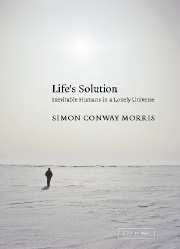Book contents
- Frontmatter
- Contents
- Preface. The Cambridge sandwich
- Acknowledgements
- List of abbreviations
- 1 Looking for Easter Island
- 2 Can we break the great code?
- 3 Universal goo: life as a cosmic principle?
- 4 The origin of life: straining the soup or our credulity?
- 5 Uniquely lucky? The strangeness of Earth
- 6 Converging on the extreme
- 7 Seeing convergence
- 8 Alien convergences?
- 9 The non-prevalence of humanoids?
- 10 Evolution bound: the ubiquity of convergence
- 11 Towards a theology of evolution
- 12 Last word
- Notes
- Index
4 - The origin of life: straining the soup or our credulity?
Published online by Cambridge University Press: 07 September 2009
- Frontmatter
- Contents
- Preface. The Cambridge sandwich
- Acknowledgements
- List of abbreviations
- 1 Looking for Easter Island
- 2 Can we break the great code?
- 3 Universal goo: life as a cosmic principle?
- 4 The origin of life: straining the soup or our credulity?
- 5 Uniquely lucky? The strangeness of Earth
- 6 Converging on the extreme
- 7 Seeing convergence
- 8 Alien convergences?
- 9 The non-prevalence of humanoids?
- 10 Evolution bound: the ubiquity of convergence
- 11 Towards a theology of evolution
- 12 Last word
- Notes
- Index
Summary
This chapter is a story of abject scientific failure. It is also a story of omission and simplification, but how else could one encapsulate this enormous and unresolved area? Perhaps by way of introduction I should mention two items. First, there are some excellent books devoted to the topic of life's origins. There are also, of course, many review papers in the literature, although almost invariably they reflect a particular school of thought so that while opposing schools receive raking fire the inadequacies of their own stance tend to receive more muted criticism. Second, here I make effectively no mention of the so-called ‘RNA world’. This ‘world’ is widely, but not universally, accepted as predating our familiar DNA-based world, and is taken to represent a key staging post that attempts to solve a sort of ‘chicken-and-egg’ question as to what came first: a system of replication to code and transmit instructions or a chemically controlled metabolism to channel energy using catalysts (a.k.a. enzymes). Proponents of the ‘RNA world’ solve this conundrum by answering this question with the reply: ‘simultaneously’. This is on the basis of earlier speculation, combined with subsequent experimental proof of two facts: first, that RNA acts as an agent of replication (in nearly all organisms this is on the basis of instructions coded in the DNA and then transferred to the RNA); second, that in some circumstances RNA acts in an enzymatic capacity (ribozymes), a role that in practically all living cells depends on particular proteins (enzymes).
- Type
- Chapter
- Information
- Life's SolutionInevitable Humans in a Lonely Universe, pp. 44 - 68Publisher: Cambridge University PressPrint publication year: 2003

